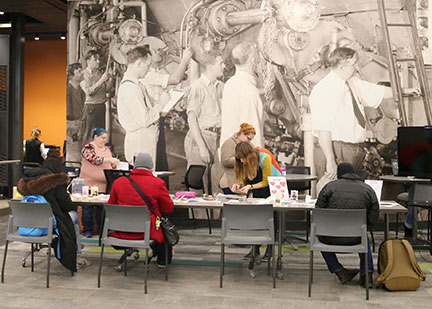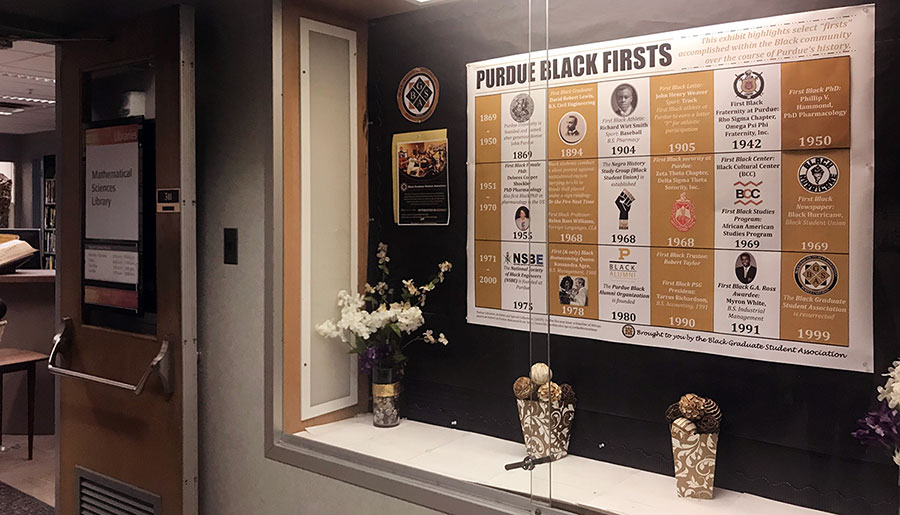Two Purdue University faculty members have been named recipients of the 2017-18 Library Scholars Grant, which supports each grant recipient’s access to unique collections of information around the country and the world.
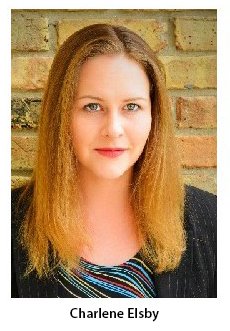 Indiana (University) Purdue (University) Fort Wayne (IPFW) Assistant Professor of Philosophy Charlene Elsby was awarded $5,000 to travel to the Husserl Archives at the Katholieke Universiteit Leuven (Catholic University, Leuven, Belgium) to continue her research about the roots of phenomenology. Purdue University Libraries Assistant Professor Kendall Roark was awarded $5,000 to conduct archival research within organizational and community collections housed in the Arizona Queer Archives (University of Arizona). Indiana (University) Purdue (University) Fort Wayne (IPFW) Assistant Professor of Philosophy Charlene Elsby was awarded $5,000 to travel to the Husserl Archives at the Katholieke Universiteit Leuven (Catholic University, Leuven, Belgium) to continue her research about the roots of phenomenology. Purdue University Libraries Assistant Professor Kendall Roark was awarded $5,000 to conduct archival research within organizational and community collections housed in the Arizona Queer Archives (University of Arizona).
Established in 1985 by the 50th anniversary gift of members of the Class of 1935, the Library Scholars Grant Program is available for non-tenured and recently tenured Purdue faculty in all disciplines from the West Lafayette, Fort Wayne, IUPUI, and Northwest campuses, as well as those in the Statewide Technology Program.
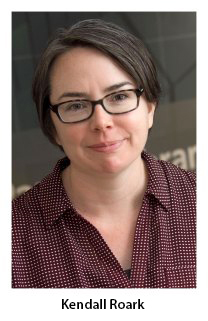 The archival research that both Elsby and Roark will undertake will be used for an individual book, a monograph, and/or a project based on their research. The archival research that both Elsby and Roark will undertake will be used for an individual book, a monograph, and/or a project based on their research.
According to Elsby, whose research project is titled, “Time-Consciousness and Transcendental Idealism,” the 2017-18 grant award will enable her to access the Husserl Archives, where she has previously conducted research supported by the Library Scholars Grant Program.
“When I left the archives in 2016, I was halfway through translating Husserl’s essay on Berkeleyan idealism, ‘Esse und Percipi,’ a work which I hope to continue, with the ultimate goal of producing an examination of the relevant differences between Husserlian and Berkeleyan idealism,” noted Elsby, who is also the interim director of the philosophy program in the IPFW Department of English and Linguistics.
Roark noted that materials from the Arizona Queer Archives, “which engages the local community in the development of its collections and prioritizes the everyday lives of LGBTQ Arizonans,” will be used to complete a final chapter of a book manuscript, tentatively titled “Oasis: Imaginative Geographies and the Marginal Locations of Queer,” as well as an online exhibit related to the history of LGBTQ activism and civic engagements along the U.S. and Mexico border.
“‘Oasis’ draws on my past ethnographic multi-modal fieldwork and archival research on hate crime memorials and anti-gay ballot initiative campaigns in Southern Arizona,” Roark explained. “The book will complement recent ethnographic work and intersectional and transnational borderlands research such as, ‘Queer Migration Politics’ by Karma Chavez (2013) and contributions to the history of sexuality such as ‘Safe Space: Gay Neighborhood History and the Politics of Violence’ by Christina Hanhardt (2013). Through this work, I seek to contribute to discussions around participatory/collaborative research, as well as material and political implications of movement, ethnographic, and archival memory practices.”
The grant program, which the Class of 1935 has supported continuously over the last 33 years, covers the recipients’ expenses associated with the cost of transportation, lodging, meals, and fees charged by the library or other collection owner.
For more information about the program, and to see the past recipients of the Library Scholars Grant Program, visit www.lib.purdue.edu/scholars/past_recipients. |

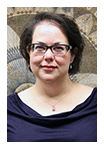 As we celebrate Black History Month, it is an appropriate time to think about the African-American students, faculty, and staff who broke new ground at Purdue and in society at large. In the Archives and Special Collections, we have been going through records from the past century and beyond to try and bring to light the individuals who were “firsts” at Purdue—the first person to graduate from a particular program, for example.
As we celebrate Black History Month, it is an appropriate time to think about the African-American students, faculty, and staff who broke new ground at Purdue and in society at large. In the Archives and Special Collections, we have been going through records from the past century and beyond to try and bring to light the individuals who were “firsts” at Purdue—the first person to graduate from a particular program, for example. 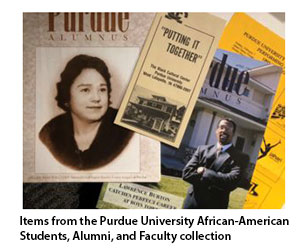 In time for Black History Month, we present the blog post, "
In time for Black History Month, we present the blog post, "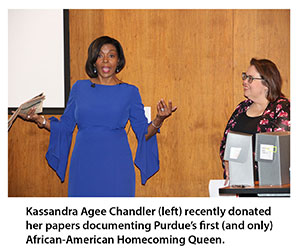 I encourage you to read Mary’s blog post to find out more about African-American pioneers at Purdue. Join us in celebrating the individuals who had the courage and persistence to be “firsts,” whether it was the first person like them in the classroom, or in making a national impact, such as the role of Purdue students in founding the National Society of Black Engineers. Purdue has been affiliated with a countless number of noteworthy individuals, and Mary’s blog post is a great starting point in getting to know some of our pioneering African-American Boilermakers. And track our progress, on the Archives and Special Collections Twitter, Instagram, and Facebook accounts to hear about current developments, such as the recent donation by Kassandra Agee Chandler of her papers documenting Purdue’s first (and only) African-American Homecoming Queen.
I encourage you to read Mary’s blog post to find out more about African-American pioneers at Purdue. Join us in celebrating the individuals who had the courage and persistence to be “firsts,” whether it was the first person like them in the classroom, or in making a national impact, such as the role of Purdue students in founding the National Society of Black Engineers. Purdue has been affiliated with a countless number of noteworthy individuals, and Mary’s blog post is a great starting point in getting to know some of our pioneering African-American Boilermakers. And track our progress, on the Archives and Special Collections Twitter, Instagram, and Facebook accounts to hear about current developments, such as the recent donation by Kassandra Agee Chandler of her papers documenting Purdue’s first (and only) African-American Homecoming Queen. Indiana (University) Purdue (University) Fort Wayne (IPFW) Assistant Professor of Philosophy
Indiana (University) Purdue (University) Fort Wayne (IPFW) Assistant Professor of Philosophy  The archival research that both Elsby and Roark will undertake will be used for an individual book, a monograph, and/or a project based on their research.
The archival research that both Elsby and Roark will undertake will be used for an individual book, a monograph, and/or a project based on their research.